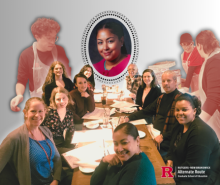How NJ Teachers and Principals Can Transform Their Schools in 180 Days
Dr. Gemar Mills, Co-Founder and Executive Director of College Achieve Paterson, is looking to spread his method for improving leadership in education through his new book, The Turnaround: 180 Days of Change. The book is inspired by Dr. Mills’ experience as principal at Shabazz High School, where he developed ideas on how to address much-needed structural changes within the educational system. The Turnaround: 180 Days of Change describes the change he envisions for education and offers strategies for educators around the country to put his ideas into practice.

The book is divided into two parts: “The Black” and “The Gold,” a reference to Shabazz High School’s school colors. The two colors are applicable to the periods of Dr. Mills’ life: the “Black” focusing on Dr. Mills’ experience in Paterson as an adolescent growing up in poverty and his challenging journey to becoming a principal; and the “Gold” which focuses on Dr. Mills’ strategies to transform any school, as he did with Shabazz High School, into a place for success for his students.
"My hope is that these stories will inspire educators to understand what you need to push through the trials and tribulations and be successful in this field,” explains Dr. Mills. “I grew up in the Christopher Columbus housing projects here in Paterson, on the same streets as the students I serve. For teachers, I want to provide context on what a black male is going through in the city of Paterson and needs to overcome. I want educators to inspire students to value what was transformational in my life, which is education. In these neighborhoods, education has not been as important as earning money immediately, which sometimes leads to choices that may cut off a scholar’s lifeline to careers in government, education, the medical field, etc.”
In “The Gold,” Dr. Mills Identifies five levers of change to help educators inspire these changes. Read on to learn these methods which can help transform the approach to education in your school!
1. Mindset
In order to best serve their classrooms, teachers must be on the same page as students. This entails maintaining a mindset that fully believes the students have the potential to do the work and succeed. For students to achieve success, teachers must be just as dedicated to the process to get the needed work done. Dr. Mills refers to this thinking as “collective efficacy,” which helps teachers and staff members move to the next level together once they collectively share this mindset. In order to hit their goals, teachers must maintain this mindset that focuses on belief in students, belief in themselves, and the ability to dedicate themselves to the work.
2. Structures
Another way to support school staff is to focus on a structured environment. Structure naturally leads to efficiency, which is needed when teachers and administrators are spread thin. One example Dr. Mills gives is providing structures throughout the building and hallways, in order to limit the number of steps students have to take, which results in helping with the flow between classes, reducing travel time, and reducing the number of incidents between classes.
Dr. Mills also recommends having an academic team focused on teacher support, with administrators doing one classroom walkthrough per teacher per day. He also advocates for breaking up tasks between administrators so each person can give appropriate attention to school, student, teacher, and parent needs.
"Grade-level vice principals are responsible for everything for that grade: coaching teachers, dealing with parent concerns, any infractions or distractions during the day,” Dr. Mills said. “Whether it’s 25 students or 125 students, they need to deal with so many areas it creates inconsistency. You promise you’ll follow up, but you’re supervising 15 people and you can’t hold those promises because of emergencies.” Structures allow educators to focus on discrete issues and build deeper relationships without being spread thin.
3. Curriculum instruction
It’s crucial for administrators to identify curriculum gaps. and to make sure the curriculum aligns with testing so students are best prepared. Dr. Mills addresses these gaps by taking a look at standard alignment and rigor levels per unit, instead of looking at the curriculum in its entirety.
"The curriculum is very general and is not necessarily aligned with what is required on standardized assessments,” Dr. Mills said. “By reviewing the curriculum in advance and comparing it with state standards, educators will be better prepared to ensure students are equipped with the skills to master assessments. The curriculum alone may not have done an excellent job of supporting that preparation.”
4. Professional development
Offering professional development opportunities doesn’t just benefit the school staff; it benefits the students as well. Education is constantly evolving and teachers must evolve with it to best serve their students.
"When you’re in there everyday and there’s no one to support you and tell you what’s next, you kind of go with the flow,” Dr. Mills explains. “It’s equally important to address teachers who have been in the profession for a long time, who may be stuck.”
Dr. Mills says it can be as simple as launching a professional-development book study to staff. One school year, Teach Like a Champion was chosen for its focus on student engagement at Shabazz High School. By implementing strategies from the book, Dr. Mills says engagement increased in a major way and more engagement meant more students moving from class compliance to class participation.
5. Monitoring
During his tenure as principal, Dr. Mills implemented walkthrough report reflections on a weekly basis to best monitor progress and goals. To make sure progress is being implemented, the staff met every Wednesday to reflect on how to keep things consistent, identify instructional pain points, choose a professional development focus for the quarter, and review student infraction data.
Through monitoring, Dr. Mills and his team were able to identify the types of infractions students frequently committed and match professional development opportunities based on what students needed. These systems helped reduce school infractions by fifty percent. Additionally, fire alarm pulls were eliminated; decreasing from 119 in a school year to 0.
"If you forget this piece, you create a model that is going to suffer and it’s going to suffer because your finger will not be on the pulse of what is working and what is not working,” Dr. Mills says about monitoring. “You’ve got to inspect what you expect.”
Now that Dr. Mills has advanced beyond his day-to-day principal duties, he’s able to focus more on disseminating his work and vision nationwide.
"I’m humbled to be able to continue to work in a space where I’m looking all the way from the top as opposed to the day-to-day of being a principal,” he said. “It’s empowering, humbling, and great to have a voice to suggest, to the board, ways we can get the students to where they need to be. It’s another action research project that supports my thinking about educating students in an urban community and see that it works.”
The Turnaround: 180 Days of Change is scheduled for a spring 2020 release. Learn more about Dr. Mills and his dedication to transforming education by visiting gemarmills.com.

 Heather Ngoma has over 25 years of experience collaborating with educators across New Jersey to drive education innovation. She currently serves as the Director of the Rutgers-GSE Alternate Route Program in the Department of Learning and Teaching, a program which helps career changers, recent college graduates, and other aspiring education professionals become licensed teachers in New Jersey. Follow her on Twitter @heatherngoma.
Heather Ngoma has over 25 years of experience collaborating with educators across New Jersey to drive education innovation. She currently serves as the Director of the Rutgers-GSE Alternate Route Program in the Department of Learning and Teaching, a program which helps career changers, recent college graduates, and other aspiring education professionals become licensed teachers in New Jersey. Follow her on Twitter @heatherngoma.





